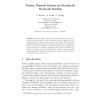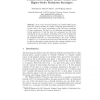1617 search results - page 86 / 324 » Knowledge Condition Games |
AAAI
2008
15 years 6 days ago
2008
Probabilistic logic programming is a powerful technique to represent and reason with imprecise probabilistic knowledge. A probabilistic logic program (PLP) is a knowledge base whi...
CEC
2009
IEEE
15 years 4 months ago
2009
IEEE
— Using a game-theoretic model combined with the evolutionary model, we investigate the conditions under which the desirable interaction rules will evolve and sustain in various ...
CONCUR
2009
Springer
15 years 4 months ago
2009
Springer
We present a new algorithm for computing the winning region of a parity game played over the configuration graph of a pushdown system. Our method gives the first extension of the...
CAAN
2007
Springer
15 years 4 months ago
2007
Springer
Abstract. Random graphs with given expected degrees G(w) were introduced by Chung and Lu so as to extend the theory of classical G(n, p) random graphs to include random power law g...
FCT
2009
Springer
15 years 1 months ago
2009
Springer
Given a set P of natural numbers, we consider infinite games where the winning condition is a regular -language parametrized by P. In this context, an -word, representing a play, h...


